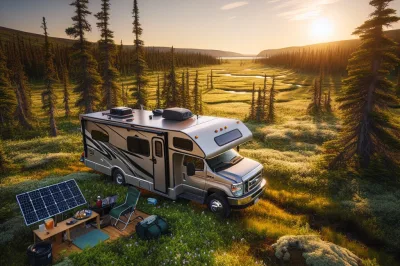Table of Contents

Empowering Your Journey: Selecting the Right Solar Battery for Off-Grid RV Living
Imagine the freedom of exploring the open road, with all the comforts of home but none of the constraints of fixed locations or utility hookups. Off-grid RV living is all about self-reliance and enjoying the great outdoors, and the heart of this lifestyle is your solar battery setup. It’s what keeps the lights on and your adventures going. Picking the right solar battery isn’t just a purchase, it’s an investment into your way of life.
Key Takeways: Article-at-a-Glance
- Solar batteries are the lifeline of off-grid RV living, providing power independence.
- Understanding the different types of solar batteries is crucial for an informed choice.
- LiFePO4, AGM, and Lithium-Ion batteries each offer unique benefits for RV use.
- Consider factors like capacity, efficiency, cost, and longevity when selecting a battery.
- Proper installation and maintenance ensure your solar battery system performs optimally.
Why Off-Grid RV Living Requires Top-Notch Solar Batteries
Off-grid living means you’re the master of your energy needs. Without a reliable power source, the conveniences of modern living quickly fade into the background. High-quality solar batteries are essential because they store the energy your solar panels capture, ensuring you have power when the sun goes down or on cloudy days. They’re not just batteries; they’re your ticket to continuous power and peace of mind.
- Store solar energy for use anytime, day or night.
- Ensure reliable power for essential appliances and devices.
- Reduce dependency on generators and fossil fuels.
- Support sustainable and environmentally friendly living.
- Enhance the overall off-grid living experience.
Choosing the best solar battery for your RV means looking for one that’s durable, efficient, and has enough storage capacity to meet your needs. It’s about finding the balance between performance and cost, without compromising on quality.
Understanding Solar Batteries and Their Role in Your RV
Solar batteries are more than just a power bank; they’re a sophisticated component of your RV’s electrical system. They work in tandem with solar panels to harness the sun’s energy, converting it into electricity that powers everything from your refrigerator to your lights. A robust solar battery system means you can enjoy the comforts of home, even when you’re miles away from the nearest power outlet.
What Makes a Solar Battery Fit for RVs?
Not all solar batteries are created equal, especially when it comes to powering an RV. The best solar batteries for RVs are those that offer a blend of longevity, capacity, and ease of use. They should be rugged enough to handle the bumps and vibrations of the road, and versatile enough to meet the unique energy demands of RV living. Here’s what to look for:
- Deep-cycle capability for long-lasting power delivery.
- High energy density to save space and weight in your RV.
- Durability to withstand the rigors of the road.
- Low maintenance so you can focus on enjoying your travels.
- Fast charging to make the most of your solar panels.
When you find a battery that ticks all these boxes, you’ll know you’re on the right track to selecting a power source that will serve you well on your off-grid adventures.
The Connection Between Solar Panels and Batteries
The synergy between solar panels and batteries is what makes the off-grid RV lifestyle possible. Solar panels convert sunlight into electricity, but it’s the batteries that store this energy for later use. This relationship is crucial; without batteries, the energy would have nowhere to go, and without solar panels, the batteries would have no way to charge. It’s a partnership where each component complements the other, ensuring you have a reliable and sustainable source of power.
Understanding this connection helps you appreciate the importance of a well-matched solar panel and battery system. It’s not just about having either piece of the puzzle; it’s about how well they work together to meet your energy needs.
Stay tuned as we dive deeper into the specifics of RV solar batteries, including the types available, how to choose the right one for your needs, and tips for installation and maintenance. Your off-grid journey is about to get a power boost!

Choosing Your Power Champion: Best Solar Batteries for RVs
When it comes to off-grid RV living, the solar battery you choose is as critical as the destination you’re heading to. It’s the silent powerhouse that keeps your journey illuminated and your essentials running smoothly. Let’s explore the top contenders in the world of RV solar batteries and find out which one might be your power champion.
LiFePO4 Batteries: The New Frontier for RV Living
LiFePO4 batteries, or lithium iron phosphate batteries, are gaining popularity among RV enthusiasts for good reasons. They’re lightweight, have a long lifespan, and offer impressive cycle counts which means they can be charged and discharged repeatedly without significant capacity loss. Plus, they’re safe – with a lower risk of thermal runaway compared to other lithium batteries. If you’re looking for a battery that’s both durable and high-performing, LiFePO4 is a solid choice.
- Long lifespan with thousands of charge cycles.
- Stable and safe chemistry reduces risk of overheating.
- Lightweight design ideal for fuel efficiency.
- Higher upfront cost but better long-term investment.
AGM Batteries: Reliable and Budget-Friendly
AGM, or Absorbed Glass Mat batteries, are a type of lead-acid battery that’s sealed and maintenance-free. They’re known for their reliability and affordability, making them a go-to for many RV owners on a budget. While they don’t have the same high energy density as lithium batteries, AGM batteries are robust and can handle a fair amount of deep discharges without suffering too much damage.
- Cost-effective for those watching their wallet.
- Spill-proof and maintenance-free design.
- Good for frequent deep cycling.
- Heavier and less efficient than lithium counterparts.
Lithium-Ion Batteries: High Performance for the Long Haul
Lithium-ion batteries are the heavy hitters in the world of portable power. They boast a high energy density, meaning they pack a lot of power into a small package. This makes them ideal for RVers who want to maximize their living space. They also charge faster and last longer than traditional lead-acid batteries, making them a great option for those who don’t want to compromise on performance.
Remember, with great power comes a higher price tag. But for many, the investment in lithium-ion batteriesis well worth it for the efficiency and longevity they bring to the table.
Comparing Battery Capacity and Efficiency
When we talk about capacity, we’re looking at how much power a battery can store, usually measured in amp-hours (Ah). Efficiency, on the other hand, is about how much of that stored power can be used by your devices. It’s important to compare these factors because they directly impact how long you can stay off-grid and how many solar panels you’ll need to recharge your batteries.
- LiFePO4 batteries offer high efficiency and capacity for their size.
- AGM batteries have lower efficiency but are more affordable.
- Lithium-ion batteries provide excellent capacity and efficiency, but at a higher cost.
It’s a balancing act between what you need, what you can carry, and what you’re willing to spend. But rest assured, there’s a solar battery out there that’s just right for your RV lifestyle.
Seeing Beyond the Price Tag: Evaluating Solar Battery Costs
It’s easy to get sticker shock when looking at the price of high-quality solar batteries. However, to truly assess their value, you need to consider more than just the initial cost. Think about longevity, maintenance, and efficiency over the lifetime of the battery. A cheaper battery might save you money upfront, but if it needs to be replaced more often or doesn’t perform as well, it could end up costing you more in the long run.
Here’s how to evaluate solar battery costs:
- Calculate the cost per cycle to understand long-term value.
- Consider the warranty and what it covers.
- Factor in maintenance costs – or the lack thereof for maintenance-free options.
- Assess the efficiency of the battery and how it will affect your solar setup.
By looking beyond the initial price and understanding the full scope of what you’re getting, you’ll be able to make an informed decision that aligns with your off-grid aspirations and budget. Remember, the best solar battery for your RV is the one that meets your specific needs and supports your journey, mile after mile.
Initial Investment vs. Long-Term Value
When it comes to off-grid living, the initial cost of a solar battery can be a bit daunting. But it’s crucial to weigh this against the long-term benefits. A high-quality solar battery may have a higher price tag upfront, but it can save you heaps in the long run. Think about it this way: a cheaper battery that needs replacing every few years is no bargain. Instead, invest in a battery that will go the distance, delivering reliable power year after year. That’s where the real value lies.
- High-quality batteries may cost more initially but have lower lifetime costs.
- Consider the total number of charge cycles you’ll get from a battery.
- Energy efficiency can lead to savings on additional solar panels or generators.
- Durability and reliability reduce the hassle and cost of frequent replacements.
By focusing on long-term value, you’re not just buying a battery; you’re investing in uninterrupted adventures and the peace of mind that comes with it.
Warranty and Replacement Considerations
A warranty isn’t just a piece of paper; it’s a promise from the manufacturer. It tells you how much they believe in their product. When selecting a solar battery, look closely at the warranty terms. How long does it cover? What does it include? A solid warranty can be a lifesaver if you encounter any issues. And let’s not forget about replacement considerations. Knowing how and where to get a replacement battery can save you a lot of stress down the road.
- Longer warranties indicate confidence in product longevity.
- Understand what’s covered: performance, capacity, manufacturing defects?
- Check the ease of claiming the warranty – a complicated process can be frustrating.
- Know the manufacturer’s reputation for honoring their warranties.
With a good warranty and clear replacement guidelines, you’ll feel more secure in your investment and ready to tackle any power challenges that come your way.

Installation Insights: Getting Your Solar Batteries Up and Running
Installing your solar batteries is a pivotal step in setting up your off-grid RV system. It’s the moment when your vision for energy independence starts to take shape. Whether you’re a seasoned DIYer or considering professional help, understanding the installation process is key. It ensures that your system is safe, efficient, and ready to harness the sun’s power.
DIY or Professional Installation?
Deciding between DIY or professional installation is a big choice. If you’re comfortable with tools and electrical systems, a DIY installation can be a rewarding project. It gives you a hands-on understanding of your system and can save you money. However, if you’re unsure or the task seems overwhelming, there’s no shame in calling in the pros. They can ensure everything is set up correctly, safely, and optimized for performance.
- DIY installation can be more cost-effective if you have the skills.
- Professional installation ensures safety and may come with additional warranties.
- Consider the complexity of your system when making your decision.
- Some battery manufacturers require professional installation for warranty validity.
Choose the path that aligns with your confidence level and the complexity of your solar setup. Either way, the goal is a smooth and secure installation.
Essential Tools and Accessories for Installation
Whether you’re going DIY or hiring a pro, knowing the tools and accessories needed for installation is beneficial. You’ll need a variety of tools, from wrenches to wire strippers, as well as safety equipment like gloves and eye protection. Don’t forget about the installation accessories either – things like mounting brackets, fuses, and cables are crucial for a successful setup.
- Basic hand tools: screwdrivers, wrenches, pliers, and a drill.
- Electrical tools: wire strippers, crimpers, and a multimeter.
- Safety gear: gloves, safety glasses, and possibly a fire extinguisher.
- Installation accessories: battery mounts, fuses, cables, and connectors.
Having the right tools and accessories at hand will make the installation process smoother and help prevent any unnecessary trips to the hardware store.
Maintaining Your Solar Battery for Optimal Performance
Once your solar batteries are installed, maintenance is what keeps them at their best. Proper care extends the life of your batteries and ensures they perform efficiently. It’s not just about longevity; it’s about getting the most out of your investment. Regular checks and balances can prevent small issues from becoming big problems.
- Regularly clean battery terminals to prevent corrosion.
- Keep batteries at the correct charge level to avoid overcharging or deep discharging.
- Inspect battery connections and cables for wear and tear.
- Monitor battery temperature and keep them within recommended ranges.
- Update firmware for battery management systems if applicable.
Maintenance is an ongoing commitment, but it’s one that pays off with a reliable power supply for all your off-grid adventures.
Regular Maintenance Checks: The Key to Longevity
Think of your solar batteries as the beating heart of your off-grid RV system. Just like any other crucial component, they thrive on attention and care. Regular maintenance checks are not just about fixing problems; they’re about preventing them. By keeping a close eye on your batteries, you can ensure they last as long as possible, saving you money and hassle in the long run.
- Check the charge levels regularly to avoid overcharging or deep discharge.
- Keep the battery terminals clean and free from corrosion.
- Ensure the batteries are securely mounted and the connections are tight.
- Inspect for any signs of wear, damage, or swelling.
- Monitor the temperature of your battery bank to keep it within safe limits.
- Balance your battery bank periodically if you’re using multiple batteries.
By performing these simple checks, you’re not just maintaining your batteries; you’re ensuring the freedom and joy of your off-grid lifestyle continues without interruption.
Troubleshooting Common Solar Battery Issues
Even with the best care, you might run into issues with your solar batteries. But don’t worry, most problems have simple solutions. If you notice your batteries aren’t holding a charge as they used to, or if there’s an unexpected drop in power, it’s time to troubleshoot. Often, the issue is something straightforward, like a loose connection or a buildup of corrosion on the terminals.
- If your battery isn’t charging, check the connections and the health of your solar panels.
- A sudden power drop could indicate a damaged battery or an issue with your RV’s electrical system.
- Swelling or leaking batteries are a sign of overcharging or internal damage and should be replaced immediately.
- Unusual battery drain could be due to parasitic loads; check for devices that may be using power when they shouldn’t be.
Remember, if you’re ever in doubt, consult the manual or reach out to a professional. It’s better to be safe than sorry when it comes to electrical systems.
FAQs: Clearing Common Misconceptions About RV Solar Batteries
Can RV Solar Batteries Power My Entire RV?
Yes, solar batteries can power your entire RV, but it all comes down to the size and capacity of your battery bank and your energy usage. If you’ve sized your system correctly, you can run all your appliances just as you would with shore power. The key is to understand your energy needs and equip your RV with a solar battery system that can meet those demands.
– Calculate your daily power consumption to determine the battery capacity needed.
– Consider energy-efficient appliances to reduce overall power usage.
– Use energy management practices, like turning off lights when not in use.
With the right setup, your solar batteries can keep everything from lights to air conditioning running smoothly.
How Often Do Solar Batteries Need to be Replaced?
The lifespan of a solar battery varies depending on the type, usage, and maintenance. Generally, you can expect a quality solar battery to last anywhere from 5 to 15 years. LiFePO4 batteries, for example, have a longer lifespan than traditional lead-acid batteries. To maximize the life of your batteries, follow the manufacturer’s guidelines for use and maintenance, and avoid exposing them to extreme temperatures.
– Regular maintenance extends battery life.
– Deep-cycle batteries designed for solar use typically last longer.
– Monitor your batteries’ performance over time to gauge when they might need replacing.
Staying on top of maintenance and usage patterns will help you get the most out of your solar batteries before they need to be replaced.
Are Solar Batteries for RVs Weather-Resistant?
Solar batteries are built to be robust, but their level of weather resistance can vary. Most are designed to handle the typical conditions encountered during RV travel. However, extreme temperatures can affect performance and lifespan. For instance, excessive heat can lead to faster discharge rates and potentially damage the battery, while extreme cold can reduce the battery’s capacity and slow down the chemical reactions needed to generate power.
– Check the battery’s specifications for temperature ranges.
– Protect your batteries from the elements by housing them in a ventilated compartment.
– Consider insulated covers for batteries if you’re traveling in extreme climates.
With proper care and precautions, your solar batteries can reliably power your RV adventures in a wide range of weather conditions.
How Much Solar Battery Capacity Do I Need for My RV?
Figuring out the right solar battery capacity for your RV is like packing for a trip. You want to have enough supplies without overloading your vehicle. To start, calculate your daily energy usage by adding up the power consumed by each appliance and device you plan to use. Once you have that number, aim for a battery capacity that can store at least one and a half times your daily usage. This extra buffer ensures you have power during low-sunlight days or unexpected energy needs.
– Make a list of all electrical devices you’ll use and their wattage.
– Estimate the number of hours each device will run daily.
– Add up the total watt-hours to find your daily energy usage.
– Factor in days of autonomy—how many days you want to go without sunlight.
– Consider seasonal changes in sunlight and adjust your capacity accordingly.
Remember, it’s better to have a bit more capacity than not enough. You’ll thank yourself for the extra power when you need it most.
Can I Expand My RV Solar Battery System in the Future?
Life is full of changes, and your energy needs might evolve as you continue your RV adventures. The good news is, expanding your solar battery system is usually possible. Start with a setup that meets your current needs but keep scalability in mind. Choose a battery with the ability to add more units in parallel or select a solar charge controller that can handle a larger array of panels and batteries. Planning for expansion will save you from having to replace your entire system when it’s time to upgrade.
– Check if your battery type allows for easy expansion.
– Ensure your solar charge controller and inverter can handle additional capacity.
– Leave space in your RV for additional batteries or panels.
– Consider the weight and balance of your RV with added batteries.
– Review your system’s wiring to ensure it can accommodate growth.
By anticipating future growth, you’re paving the way for a seamless transition when you decide it’s time for more power.
In conclusion, selecting the best RV solar battery for off-grid living is a critical step towards energy independence on the road. Whether you opt for LiFePO4, AGM, or Lithium-Ion batteries, the key is to choose a reliable power source that suits your lifestyle and fits your budget. Remember to factor in capacity, efficiency, cost, and potential for expansion. With the right solar battery system, you’ll enjoy the freedom of the open road without the constraints of traditional power sources, making every journey an adventure.
As you embark on this exciting chapter, embrace the peace of mind that comes with a well-chosen solar battery system. It’s not just about the destinations you’ll explore; it’s about the memories you’ll create along the way. So charge up, hit the road, and let the sun guide you to your next off-grid experience.
- Boondocking RVs: Flexible Solar Solutions – 3 March 2024
- Renewable Energy Tips for Full-Time Boondocking RVers – 2 March 2024
- Boondocking Solar Power Systems: Sizing Options & Solutions for Motorhomes – 1 March 2024
